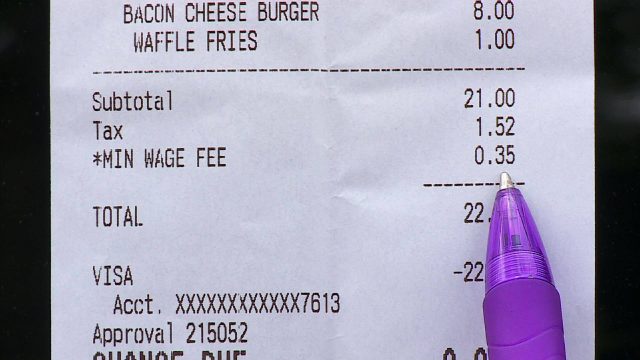Minnesota Restaurant Adds Minimum Wage Surcharge To Customer Bills

On August 1st, Minnesota’s new minimum wage policy became law. The state’s minimum wage (with a few exceptions for younger workers and small businesses detailed here) has jumped to $8.00, or $0.75 per hour more than the current federal minimum. By 2016, the state’s minimum wage will hit $9.50 per hour. Then, starting in 2018, increases in the minimum wage are indexed to inflation though whoever is Governor of the state then can opt to delay any yearly increase in the wage.
Supporters of the minimum wage take it as an article of faith that this sort of wage manipulation has no impact on the private sector. But one business in Minnesota – the Oasis Cafe in Stillwater – disputes that notion, adding a surcharge to their customer’s bills because of the minimum wage hike.
“You’re essentially blaming customers for the increase when you charge for it the way you do,” one customer wrote on Facebook.
Another said: “It’s Oasis way of blaming our government for trying to set a fair living wage. It is political grandstanding.”
Oasis owners fired back on Facebook, saying: “Thumbing my nose at the law change, you’re right. Part of my thinking was to shine a light on this matter, which I truly believe is in the best interest of both my business and employees.”
Really, this is a matter of transparency.
Where do you suppose the money to pay workers higher wages comes from? It doesn’t appear magically out of thin air. It’s going to come from the pockets of business owners who, in turn, are going to pass that overhead cost on to their customers.
Meaning me and you.
The only difference between this business owner and most others is that he’s being a bit more open about why his prices are going up slightly, though I’d point out that a restaurant serving 250 tickets per day, five days per week, is going to take in another $875 per week or $1,750 per month.
Which is probably about right for the impact of the minimum wage on this company’s expenses.
If this upsets you, blame the state government. They created the policy, not the restaurant owner.




